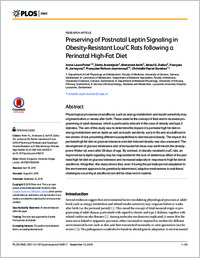Preserving of postnatal leptin signaling in obesity-resistant lou/c rats following a perinatal high-fat diet
- Poher, Anne-Laure Department of Cell Physiology and Metabolism,Faculty of Medicine, University of Geneva, Switzerland - Laboratory of Metabolism, Department of Medicine Specialties, Faculty of Medicine, University of Geneva, Switzerland
- Arsenijevic, Denis Department of Medicine/Physiology, University of Fribourg, Switzerland
- Asrih, Mohamed Service of Endocrinology, Diabetes and Metabolism, Lausanne University Hospital, Lausanne, Switzerland
- Dulloo, Abdul G. Department of Medicine/Physiology, University of Fribourg, Switzerland
- Jornayvaz, François R. Service of Endocrinology, Diabetes and Metabolism, Lausanne University Hospital, Lausanne, Switzerland
- Rohner-Jeanrenaud, Françoise Department of Cell Physiology and Metabolism,Faculty of Medicine, University of Geneva, Switzerland - Laboratory of Metabolism, Department of Medicine Specialties, Faculty of Medicine, University of Geneva, Switzerland
- Veyrat-Durebex, Christelle Department of Cell Physiology and Metabolism,Faculty of Medicine, University of Geneva, Switzerland
-
12.09.2016
Published in:
- PLOS ONE. - 2016, vol. 11, no. 9, p. e0162517
English
Physiological processes at adulthood, such as energy metabolism and insulin sensitivity may originate before or weeks after birth. These underlie the concept of fetal and/or neonatal programming of adult diseases, which is particularly relevant in the case of obesity and type 2 diabetes. The aim of this study was to determine the impact of a perinatal high fat diet on energy metabolism and on leptin as well as insulin sensitivity, early in life and at adulthood in two strains of rats presenting different susceptibilities to diet-induced obesity. The impact of a perinatal high fat diet on glucose tolerance and diet-induced obesity was also assessed. The development of glucose intolerance and of increased fat mass was confirmed in the obesity-prone Wistar rat, even after 28 days of age. By contrast, in obesity-resistant Lou/C rats, an improved early leptin signaling may be responsible for the lack of deleterious effect of the perinatal high fat diet on glucose tolerance and increased adiposity in response to high fat diet at adulthood. Altogether, this study shows that, even if during the perinatal period adaptation to the environment appears to be genetically determined, adaptive mechanisms to nutritional challenges occurring at adulthood can still be observed in rodents.
- Faculty
- Faculté des sciences et de médecine
- Department
- Département de Médecine
- Language
-
- English
- Classification
- Biological sciences
- License
-
License undefined
- Identifiers
-
- RERO DOC 278631
- DOI 10.1371/journal.pone.0162517
- Persistent URL
- https://folia.unifr.ch/unifr/documents/305429
Statistics
Document views: 133
File downloads:
- pdf: 180
